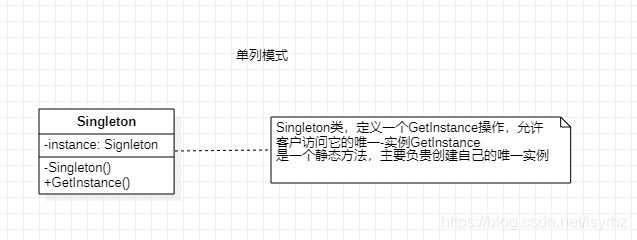热门标签
热门文章
- 1Python之字符串的前缀_python 字符串 b前缀
- 2打造次世代分析型数据库(四):几十张表关联?小Case!_腾讯张倩数据专家工程师
- 3springboot mysql 事务_springboot整合mysql开启事务
- 4部署全文索引的最佳做法 _部署全局代码后才会被引擎收录索引吗
- 5react学习笔记_reactpy
- 6GPL3.0、Apache LICENSE 2.0 和 MIT LICENSE的区别_gpl-3.0 license
- 7html保存blob,HTML文本图像并保存为Blob到数据库
- 8root用户可以通过phpmyadmin登录,普通用户却不行,提示1045的错误
- 9使用mybatis来操作oracle
- 10主流机器学习平台调研与对比分析_模型开发提供模型构建、训练、调优、评估等在内的机器学习、深度学习能力,
当前位置: article > 正文
设计模式之 单例模式_单例模式在嵌入式中的应用
作者:笔触狂放9 | 2024-02-26 04:04:58
赞
踩
单例模式在嵌入式中的应用
介绍
几个重点:
- 构造函数为private
- 提供一个获取单例对象指针的函数
- 一个静态指针成员存储单例对象
注意:
- 获取单例对象也可以获取对象引用,但要注意拷贝构造函数和赋值运算符
- 如果有多线程访问单例,需要注意线程同步
UML类图:

简单示例:
懒汉和饿汉模式:
- #ifndef SIMPLE_SINGLETON_H
- #define SIMPLE_SINGLETON_H
-
- #include <iostream>
- using namespace std;
-
- /**
- * @brief The LazySingleton class
- * 懒汉模式
- */
- class LazySingleton
- {
- public:
- static LazySingleton *getInstance()
- {
- if( m_instance == nullptr)
- m_instance = new LazySingleton;
-
- return m_instance;
- }
-
- static void freeInstance()
- {
- if( m_instance != nullptr )
- delete m_instance;
-
- m_instance = nullptr;
- }
- private:
- LazySingleton()
- {
- cout<<" LazySingleton 构造函数执行"<<endl;
- }
- static LazySingleton *m_instance ;
- };
- LazySingleton *LazySingleton::m_instance = nullptr;
-
-
- /**
- * @brief The HungrySingleton class
- * 饿汉模式,一般用不到
- */
- class HungrySingleton
- {
- public:
- static HungrySingleton *getInstance()
- {
- if( m_instance == nullptr)
- m_instance = new HungrySingleton;
-
- return m_instance;
- }
-
- static void freeInstance()
- {
- if( m_instance != nullptr )
- delete m_instance;
-
- m_instance = nullptr;
- }
- private:
- HungrySingleton()
- {
- cout<<" HungrySingleton 构造函数执行"<<endl;
- }
- static HungrySingleton *m_instance ;
- };
- HungrySingleton *HungrySingleton::m_instance = new HungrySingleton;
-
- #endif // SIMPLE_SINGLETON_H

懒汉线程安全模式:
- #ifndef THREAD_SINGLETON_H
- #define THREAD_SINGLETON_H
-
- #include <iostream>
- #include <stdio.h>
- #include <string.h>
- #include <unistd.h>
- #include <pthread.h>
- using namespace std;
-
-
- void printids(const char *s)
- {
- pid_t pid;
- pthread_t tid;
- pid = getpid();
- tid = pthread_self();
- printf("%s pid %u tid %u (0x%x)\n", s, (unsigned int) pid,
- (unsigned int) tid, (unsigned int) tid);
- }
-
-
-
-
- class LazySingleton
- {
- public:
- static LazySingleton *getInstance()
- {
-
- // if( m_instance == nullptr)
- // {
- // m_count++;
- // m_instance = new LazySingleton;
- // }
-
- if( m_instance == nullptr)
- {
- pthread_mutex_lock(&m_mutex_lock);
-
- if( m_instance == nullptr)
- {
- m_count++;
- m_instance = new LazySingleton;
- }
-
- pthread_mutex_unlock(&m_mutex_lock);
- }
-
-
-
- return m_instance;
- }
-
- static void freeInstance()
- {
- if( m_instance != nullptr )
- delete m_instance;
-
- pthread_mutex_destroy(&m_mutex_lock);
- m_instance = nullptr;
- }
-
- void showMessage()
- {
- cout<<"LazySingleton message!"<<endl;
- }
- private:
- LazySingleton()
- {
-
-
- cout<<" LazySingleton 构造函数执行开始"<<endl;
- sleep(2);
- cout<<" LazySingleton 构造函数执行 ["<<m_count<<"] 次"<<endl;
- }
- static LazySingleton *m_instance ;
- static int m_count;
- static pthread_mutex_t m_mutex_lock;
- };
- LazySingleton *LazySingleton::m_instance = nullptr;
- int LazySingleton::m_count = 0;
- pthread_mutex_t LazySingleton::m_mutex_lock = PTHREAD_MUTEX_INITIALIZER;
-
-
- void *thr_fn(void *arg)
- {
- // printids("new thread: ");
-
- LazySingleton::getInstance()->showMessage();
- return nullptr;
- }
-
- #endif // THREAD_SINGLETON_H

线程安全,调用方式:
- printids("main thread:");
- int err;
- pthread_t ntid[3];
- for (int i=0 ; i<3 ; i++) {
- err = pthread_create(&ntid[i], NULL, thr_fn, NULL);
- if (err != 0)
- printf("can't create thread: %s\n", strerror(err));
-
-
- }
- for (int i=0; i < 3 ; i++) {
- pthread_join(ntid[i],NULL);
- }
内部静态类(懒汉)方式:
-
- class StackSingleton
- {
- public:
- static StackSingleton *getInstance()
- {
- //内部静态实例的懒汉模式
- pthread_mutex_lock(&m_mutex_lock);
- static StackSingleton _instance ;
- pthread_mutex_unlock(&m_mutex_lock);
- return &_instance;
- }
-
- void printS()
- {
- cout<<"栈方式的单例模式..."<<endl;
- }
-
-
- private:
- StackSingleton()
- {
- cout<<" StackSingleton 构造函数执行"<<endl;
- }
-
- static pthread_mutex_t m_mutex_lock;
-
- };
- pthread_mutex_t StackSingleton::m_mutex_lock = PTHREAD_MUTEX_INITIALIZER;

声明:本文内容由网友自发贡献,不代表【wpsshop博客】立场,版权归原作者所有,本站不承担相应法律责任。如您发现有侵权的内容,请联系我们。转载请注明出处:https://www.wpsshop.cn/w/笔触狂放9/article/detail/143884
推荐阅读
相关标签


